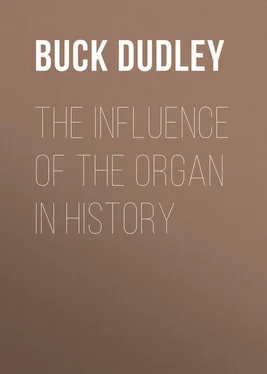Dudley Buck - The Influence of the Organ in History
Здесь есть возможность читать онлайн «Dudley Buck - The Influence of the Organ in History» — ознакомительный отрывок электронной книги совершенно бесплатно, а после прочтения отрывка купить полную версию. В некоторых случаях можно слушать аудио, скачать через торрент в формате fb2 и присутствует краткое содержание. Жанр: foreign_antique, foreign_prose, Историческая проза, на английском языке. Описание произведения, (предисловие) а так же отзывы посетителей доступны на портале библиотеки ЛибКат.
- Название:The Influence of the Organ in History
- Автор:
- Жанр:
- Год:неизвестен
- ISBN:нет данных
- Рейтинг книги:4 / 5. Голосов: 1
-
Избранное:Добавить в избранное
- Отзывы:
-
Ваша оценка:
- 80
- 1
- 2
- 3
- 4
- 5
The Influence of the Organ in History: краткое содержание, описание и аннотация
Предлагаем к чтению аннотацию, описание, краткое содержание или предисловие (зависит от того, что написал сам автор книги «The Influence of the Organ in History»). Если вы не нашли необходимую информацию о книге — напишите в комментариях, мы постараемся отыскать её.
The Influence of the Organ in History — читать онлайн ознакомительный отрывок
Ниже представлен текст книги, разбитый по страницам. Система сохранения места последней прочитанной страницы, позволяет с удобством читать онлайн бесплатно книгу «The Influence of the Organ in History», без необходимости каждый раз заново искать на чём Вы остановились. Поставьте закладку, и сможете в любой момент перейти на страницу, на которой закончили чтение.
Интервал:
Закладка:
It was not long before the transition period began, – that period in which musicians and composers tested and decided upon that which was best and most fitting in the treatment of these respective instruments. Nowhere can we find more evident signs of this time of experiment, this gradually leaving old landmarks and seeking a new form of expression, than in the works of Bach himself.
In the "Well-Tempered Clavier" we find preludes and fugues impossible to properly interpret on any other instrument except the piano, placed side by side with those whose real significance can only be developed upon the organ. In a portion of the pieces written especially for the organ, we find, on the other hand, passages which to modern ears are only fit for and tolerable on the piano. The dividing lines of effect, not to say possibility, had not as yet been fully marked out. The organ was no more disposed to give up its long sway, and be narrowed to its own particular sphere, than any other sovereign, when the limiting influences of modern times first began to make themselves felt. Like them, however, it was obliged to yield. Little by little the piano emancipated itself from the strict contrapuntal chain which bound it to the organ, until, in the sonatas of Mozart and Beethoven, it emerged into a new life.
Here it was strengthened by the free contrapuntal treatment it received, like the fruits of early education showing themselves in new and original forms, – speaking a language founded indeed on the past, but new, fresh, and sparkling; or, when adopting the strict style, taking it up as a matter of choice, but not of compulsion. Such results followed the invention of the harpsichord, – the early piano, – and here we must leave it. It would, however, be an interesting subject to trace this development down to Chopin, Liszt, and the modern Titans of the piano, showing how gradually the mutual treatment of piano and organ disappeared and what was substituted in their place. It could, however, only be satisfactorily done by musical examples.
Meanwhile the orchestra blossomed into a new significance. To us moderns who read its history, or look back into the scores which antedate this time, it does not seem so much a period to be described, as that of progress, as that of a veritable new birth itself, a new creation. And this is, indeed, the fact; for no improvements in ancient instruments, although they took place, nor addition of new ones, can account for the change which now occurred in the orchestra. Here it was the man , not the instrument; and the name of Joseph Haydn will always be quoted as "Father of the Modern Orchestra."
The organ lost nothing of real value to itself by this increased significance of other branches of instrumental music. Its sphere became defined, and in Germany quite limited, as to this day it is but rarely employed there in the way of accompaniment beyond supporting the choral song of the congregation. In France and England it has been different, the organ having been employed to accompany many anthems and other extended pieces of music, which in Germany (at least in the larger cities) would be given with the orchestra. It should be noticed that to England we owe one great improvement, which, especially for the rôle the organ is called upon to fill in this country, can scarcely be overrated. I refer to the invention of the swell, and the great variety of effects we are enabled to achieve by its means in both accompaniment and solo playing.
SECTION III
In the London "Spectator" of Feb. 8, 1712, is the following announcement: —
"Whereas, Mr. Abraham Jordan, senior and junior, have, with their own hands, joynery excepted, made and erected a very large organ in St. Magnus' church, at the foot of London bridge, consisting of four sets of keys, one of which is adapted to the art of emitting the sounds by swelling the notes, which was never in any organ before ; this instrument will be publicly opened on Sunday next, the performance by Mr. John Robinson. The above said Abraham Jordan gives notice to all masters and performers, that he will attend every day next week at the said church, to accommodate all those gentlemen who shall have a curiosity to hear it."
Very little is known of this Mr. Jordan, except that his invention pleased greatly, and was found of such practical use, that not only were all new organs in England (virtually from this date) furnished with swells, but himself and son found much occupation in adapting and adding their invention to the older London organs. The lack of a swell is the weakest point of the great majority of German organs. Even Dr. Burney, fifty years after swells had become common in England, expresses, in his famous work entitled The Present State of Music in Germany, the Netherlands and United Provinces , two volumes, also The Present State of Music in France and Italy , his great surprise to find them utterly unknown upon the Continent. His remarks would hold true at the present day with but little modification, as far as Germany is concerned, few instruments outside the larger ones of recent date possessing this great improvement. The reason of this is to be found, partly in the extremely conservative character of their organ-builders, almost a national trait, and still more in the fact that but little use would be found for a swell organ outside solo playing. With us, nearly the reverse is true, the swell being most indispensable in accompanying choirs as here constituted. Notwithstanding this neglect of what seems to us an indispensable addition to the instrument, the glory of the invention and perfection of the organ justly belongs to Germany. Modern organ-building requires the most profound study of the laws both of mechanics and acoustics, and the German mind was constitutionally fitted, by a natural depth and thoroughness of thought, together with the truly artistic quality of patience, to be successful in solving this great problem, – the creation of the most complex instrument known.
France, too, has produced her great organs and organ-builders. If often lacking the sublimity and solidity of tone characteristic of many of the famous German organs, they interest (particularly the American taste) by a greater variety of the so-called "fancy," or solo stops. This difference, too, has grown out of the nature of the duties demanded of the organ and the organist in the service of the Roman Catholic church, and it is these differences of usage which in process of time, combining with further differences of national taste, led to that varied style and treatment which we denominate "Schools of Playing."
We divide these schools into the German, French, and English.
The first of these, the German school, is especially characterized by the importance given to the use of the pedals, the feet being called upon to execute passages of equal melodic value with that assigned to the fingers. This renders it the school of schools for those who would really attain a mastery of the instrument, and gain that independence of foot and finger so difficult to acquire. In fact, it is only possible by a thorough study of the great masters in this school of playing, to destroy that sympathy which exists between the left hand and the feet. This sympathy lies in the fact that should a pedal passage ascending occur in conjunction with a left-hand passage descending , the natural inclination of the left hand is to follow the pedal, instead of executing its own independent part. Of course the same trouble is experienced if the conditions, as just stated, should be reversed. This is the great difficulty of the obbligato , or independent mode of treating the pedals, to conquer which may fairly be termed a life-study. For this reason the earnest student should always begin his studies in this school, and not deviate therefrom until such time as a reasonable degree of skill has been attained, and the sympathy between hands and feet, before alluded to, measurably overcome. And here let me say that far too many of those who feel themselves drawn towards the study of the organ, approach such study unprepared. The organ, as a keyed instrument, has all the main points of technique in common with the piano. All the varied forms of scales, arpeggios, &c., together with the necessary independence of finger requisite to play in the legato style, should first be learned upon the piano, where, by the way, it can be more speedily acquired. Pupils who, having accomplished this, proceed to the study of the organ, can at once begin with the peculiarities and characteristic difficulties of the instrument, and as far as the pedal is concerned, will make far more rapid progress if fair manual players. They are thus enabled to concentrate their attention upon that which is new and strange to them. Such would undoubtedly be the testimony of all those who have had experience in this branch of teaching.
Читать дальшеИнтервал:
Закладка:
Похожие книги на «The Influence of the Organ in History»
Представляем Вашему вниманию похожие книги на «The Influence of the Organ in History» списком для выбора. Мы отобрали схожую по названию и смыслу литературу в надежде предоставить читателям больше вариантов отыскать новые, интересные, ещё непрочитанные произведения.
Обсуждение, отзывы о книге «The Influence of the Organ in History» и просто собственные мнения читателей. Оставьте ваши комментарии, напишите, что Вы думаете о произведении, его смысле или главных героях. Укажите что конкретно понравилось, а что нет, и почему Вы так считаете.












